Leadership and Management for Service Industries - Technology Report
VerifiedAdded on 2023/01/23
|8
|2086
|47
Report
AI Summary
This report delves into the critical aspects of leadership and management within the service sector, specifically examining the transformative impact of technology. The report begins by outlining the characteristics and skills essential for effective managers, differentiating between hard and soft skills, and highlighting the importance of reflective practice. It then explores change management systems in the service sector, comparing and contrasting different models like the Lewin change model and culture mapping, while also analyzing how changes influence management and leadership styles. The report emphasizes how technology has been adopted to respond to change management and enhance leadership skills within the service sector, providing insights into digital marketing, customer experience analysis, and the role of technology in staff training and performance. The conclusion synthesizes the key findings, emphasizing the dynamic interplay between leadership, management, and technology in achieving organizational objectives within the hospitality industry.
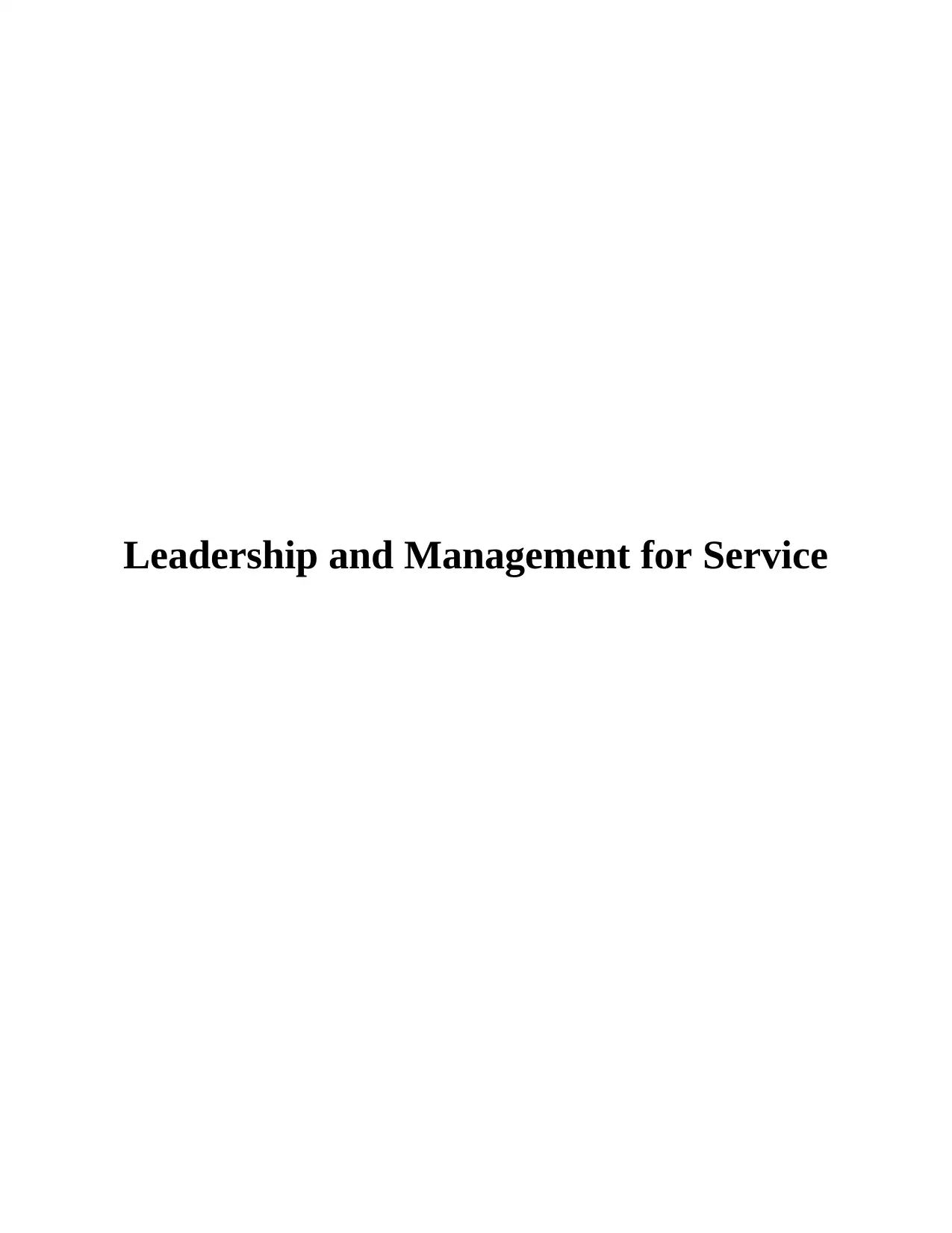
Leadership and Management for Service
Paraphrase This Document
Need a fresh take? Get an instant paraphrase of this document with our AI Paraphraser
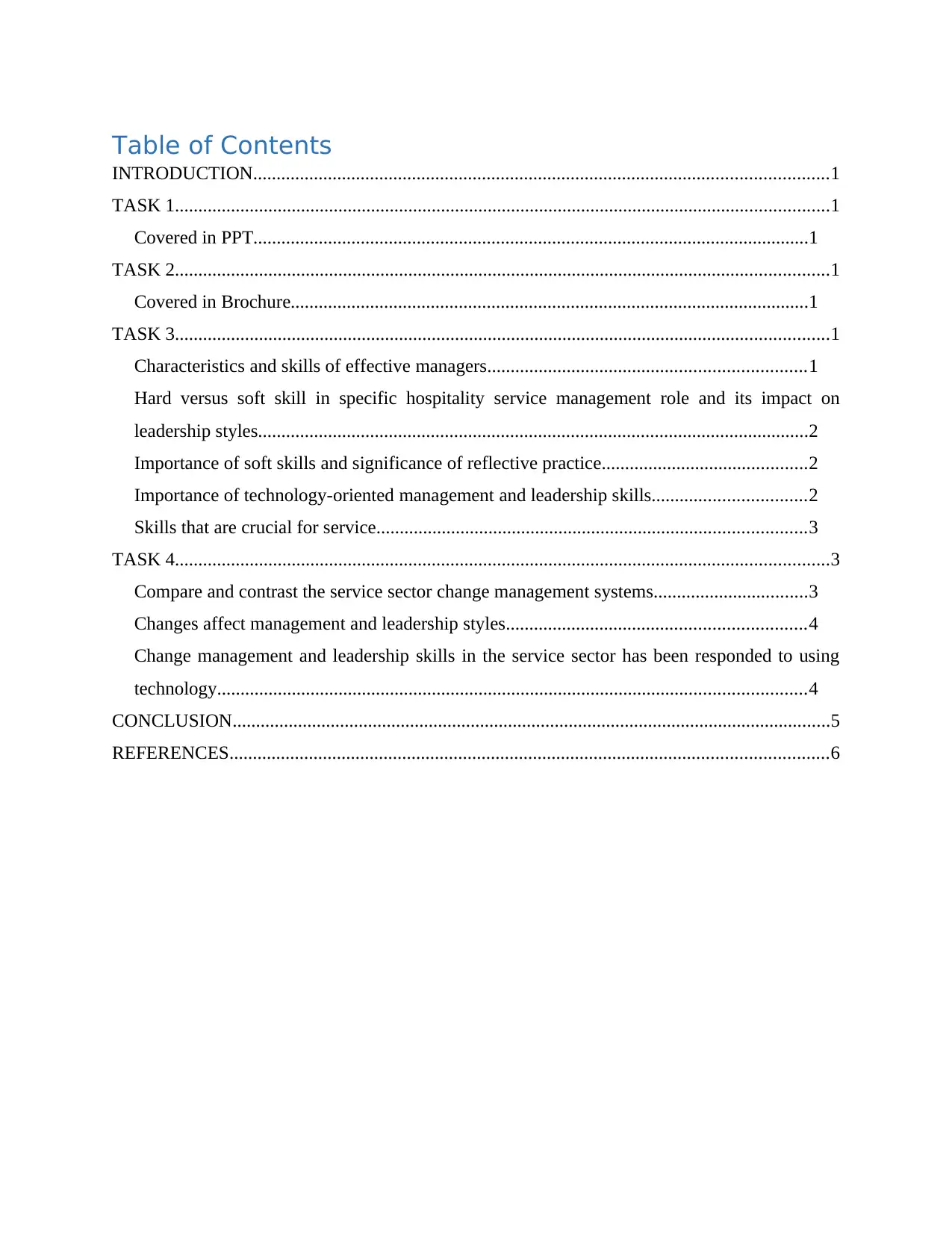
Table of Contents
INTRODUCTION...........................................................................................................................1
TASK 1............................................................................................................................................1
Covered in PPT.......................................................................................................................1
TASK 2............................................................................................................................................1
Covered in Brochure...............................................................................................................1
TASK 3............................................................................................................................................1
Characteristics and skills of effective managers....................................................................1
Hard versus soft skill in specific hospitality service management role and its impact on
leadership styles......................................................................................................................2
Importance of soft skills and significance of reflective practice............................................2
Importance of technology-oriented management and leadership skills.................................2
Skills that are crucial for service............................................................................................3
TASK 4............................................................................................................................................3
Compare and contrast the service sector change management systems.................................3
Changes affect management and leadership styles................................................................4
Change management and leadership skills in the service sector has been responded to using
technology..............................................................................................................................4
CONCLUSION................................................................................................................................5
REFERENCES................................................................................................................................6
INTRODUCTION...........................................................................................................................1
TASK 1............................................................................................................................................1
Covered in PPT.......................................................................................................................1
TASK 2............................................................................................................................................1
Covered in Brochure...............................................................................................................1
TASK 3............................................................................................................................................1
Characteristics and skills of effective managers....................................................................1
Hard versus soft skill in specific hospitality service management role and its impact on
leadership styles......................................................................................................................2
Importance of soft skills and significance of reflective practice............................................2
Importance of technology-oriented management and leadership skills.................................2
Skills that are crucial for service............................................................................................3
TASK 4............................................................................................................................................3
Compare and contrast the service sector change management systems.................................3
Changes affect management and leadership styles................................................................4
Change management and leadership skills in the service sector has been responded to using
technology..............................................................................................................................4
CONCLUSION................................................................................................................................5
REFERENCES................................................................................................................................6
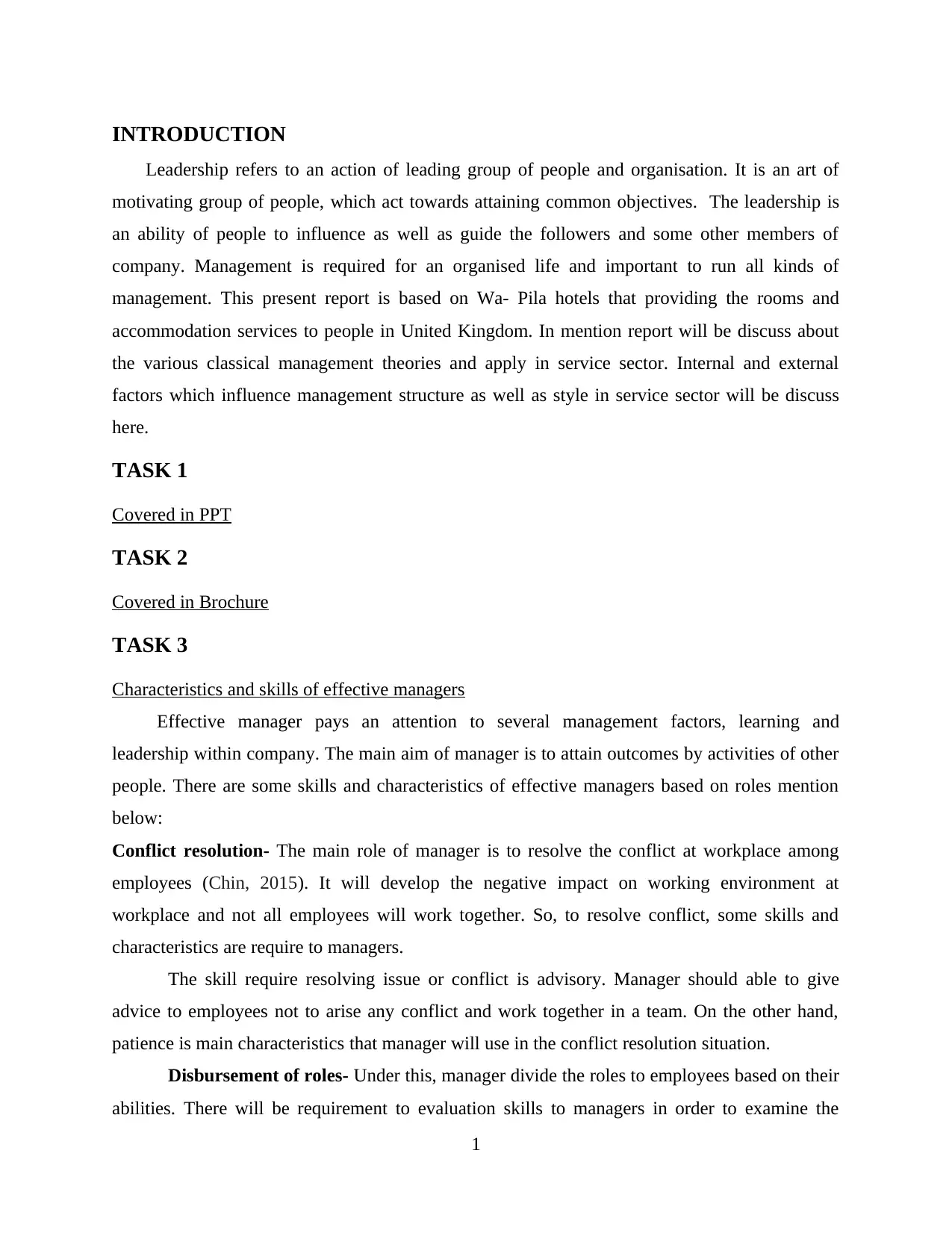
INTRODUCTION
Leadership refers to an action of leading group of people and organisation. It is an art of
motivating group of people, which act towards attaining common objectives. The leadership is
an ability of people to influence as well as guide the followers and some other members of
company. Management is required for an organised life and important to run all kinds of
management. This present report is based on Wa- Pila hotels that providing the rooms and
accommodation services to people in United Kingdom. In mention report will be discuss about
the various classical management theories and apply in service sector. Internal and external
factors which influence management structure as well as style in service sector will be discuss
here.
TASK 1
Covered in PPT
TASK 2
Covered in Brochure
TASK 3
Characteristics and skills of effective managers
Effective manager pays an attention to several management factors, learning and
leadership within company. The main aim of manager is to attain outcomes by activities of other
people. There are some skills and characteristics of effective managers based on roles mention
below:
Conflict resolution- The main role of manager is to resolve the conflict at workplace among
employees (Chin, 2015). It will develop the negative impact on working environment at
workplace and not all employees will work together. So, to resolve conflict, some skills and
characteristics are require to managers.
The skill require resolving issue or conflict is advisory. Manager should able to give
advice to employees not to arise any conflict and work together in a team. On the other hand,
patience is main characteristics that manager will use in the conflict resolution situation.
Disbursement of roles- Under this, manager divide the roles to employees based on their
abilities. There will be requirement to evaluation skills to managers in order to examine the
1
Leadership refers to an action of leading group of people and organisation. It is an art of
motivating group of people, which act towards attaining common objectives. The leadership is
an ability of people to influence as well as guide the followers and some other members of
company. Management is required for an organised life and important to run all kinds of
management. This present report is based on Wa- Pila hotels that providing the rooms and
accommodation services to people in United Kingdom. In mention report will be discuss about
the various classical management theories and apply in service sector. Internal and external
factors which influence management structure as well as style in service sector will be discuss
here.
TASK 1
Covered in PPT
TASK 2
Covered in Brochure
TASK 3
Characteristics and skills of effective managers
Effective manager pays an attention to several management factors, learning and
leadership within company. The main aim of manager is to attain outcomes by activities of other
people. There are some skills and characteristics of effective managers based on roles mention
below:
Conflict resolution- The main role of manager is to resolve the conflict at workplace among
employees (Chin, 2015). It will develop the negative impact on working environment at
workplace and not all employees will work together. So, to resolve conflict, some skills and
characteristics are require to managers.
The skill require resolving issue or conflict is advisory. Manager should able to give
advice to employees not to arise any conflict and work together in a team. On the other hand,
patience is main characteristics that manager will use in the conflict resolution situation.
Disbursement of roles- Under this, manager divide the roles to employees based on their
abilities. There will be requirement to evaluation skills to managers in order to examine the
1
⊘ This is a preview!⊘
Do you want full access?
Subscribe today to unlock all pages.

Trusted by 1+ million students worldwide
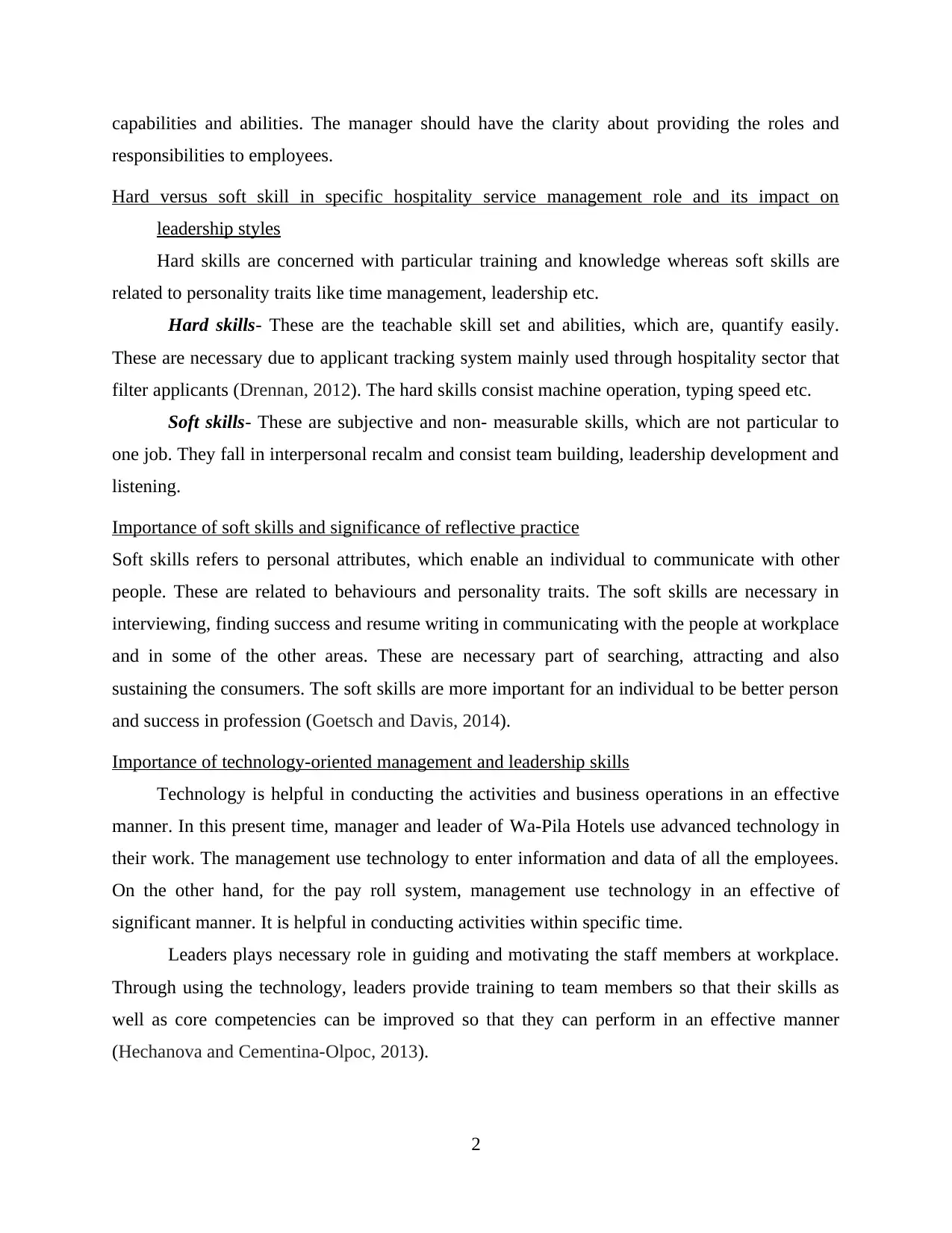
capabilities and abilities. The manager should have the clarity about providing the roles and
responsibilities to employees.
Hard versus soft skill in specific hospitality service management role and its impact on
leadership styles
Hard skills are concerned with particular training and knowledge whereas soft skills are
related to personality traits like time management, leadership etc.
Hard skills- These are the teachable skill set and abilities, which are, quantify easily.
These are necessary due to applicant tracking system mainly used through hospitality sector that
filter applicants (Drennan, 2012). The hard skills consist machine operation, typing speed etc.
Soft skills- These are subjective and non- measurable skills, which are not particular to
one job. They fall in interpersonal recalm and consist team building, leadership development and
listening.
Importance of soft skills and significance of reflective practice
Soft skills refers to personal attributes, which enable an individual to communicate with other
people. These are related to behaviours and personality traits. The soft skills are necessary in
interviewing, finding success and resume writing in communicating with the people at workplace
and in some of the other areas. These are necessary part of searching, attracting and also
sustaining the consumers. The soft skills are more important for an individual to be better person
and success in profession (Goetsch and Davis, 2014).
Importance of technology-oriented management and leadership skills
Technology is helpful in conducting the activities and business operations in an effective
manner. In this present time, manager and leader of Wa-Pila Hotels use advanced technology in
their work. The management use technology to enter information and data of all the employees.
On the other hand, for the pay roll system, management use technology in an effective of
significant manner. It is helpful in conducting activities within specific time.
Leaders plays necessary role in guiding and motivating the staff members at workplace.
Through using the technology, leaders provide training to team members so that their skills as
well as core competencies can be improved so that they can perform in an effective manner
(Hechanova and Cementina-Olpoc, 2013).
2
responsibilities to employees.
Hard versus soft skill in specific hospitality service management role and its impact on
leadership styles
Hard skills are concerned with particular training and knowledge whereas soft skills are
related to personality traits like time management, leadership etc.
Hard skills- These are the teachable skill set and abilities, which are, quantify easily.
These are necessary due to applicant tracking system mainly used through hospitality sector that
filter applicants (Drennan, 2012). The hard skills consist machine operation, typing speed etc.
Soft skills- These are subjective and non- measurable skills, which are not particular to
one job. They fall in interpersonal recalm and consist team building, leadership development and
listening.
Importance of soft skills and significance of reflective practice
Soft skills refers to personal attributes, which enable an individual to communicate with other
people. These are related to behaviours and personality traits. The soft skills are necessary in
interviewing, finding success and resume writing in communicating with the people at workplace
and in some of the other areas. These are necessary part of searching, attracting and also
sustaining the consumers. The soft skills are more important for an individual to be better person
and success in profession (Goetsch and Davis, 2014).
Importance of technology-oriented management and leadership skills
Technology is helpful in conducting the activities and business operations in an effective
manner. In this present time, manager and leader of Wa-Pila Hotels use advanced technology in
their work. The management use technology to enter information and data of all the employees.
On the other hand, for the pay roll system, management use technology in an effective of
significant manner. It is helpful in conducting activities within specific time.
Leaders plays necessary role in guiding and motivating the staff members at workplace.
Through using the technology, leaders provide training to team members so that their skills as
well as core competencies can be improved so that they can perform in an effective manner
(Hechanova and Cementina-Olpoc, 2013).
2
Paraphrase This Document
Need a fresh take? Get an instant paraphrase of this document with our AI Paraphraser
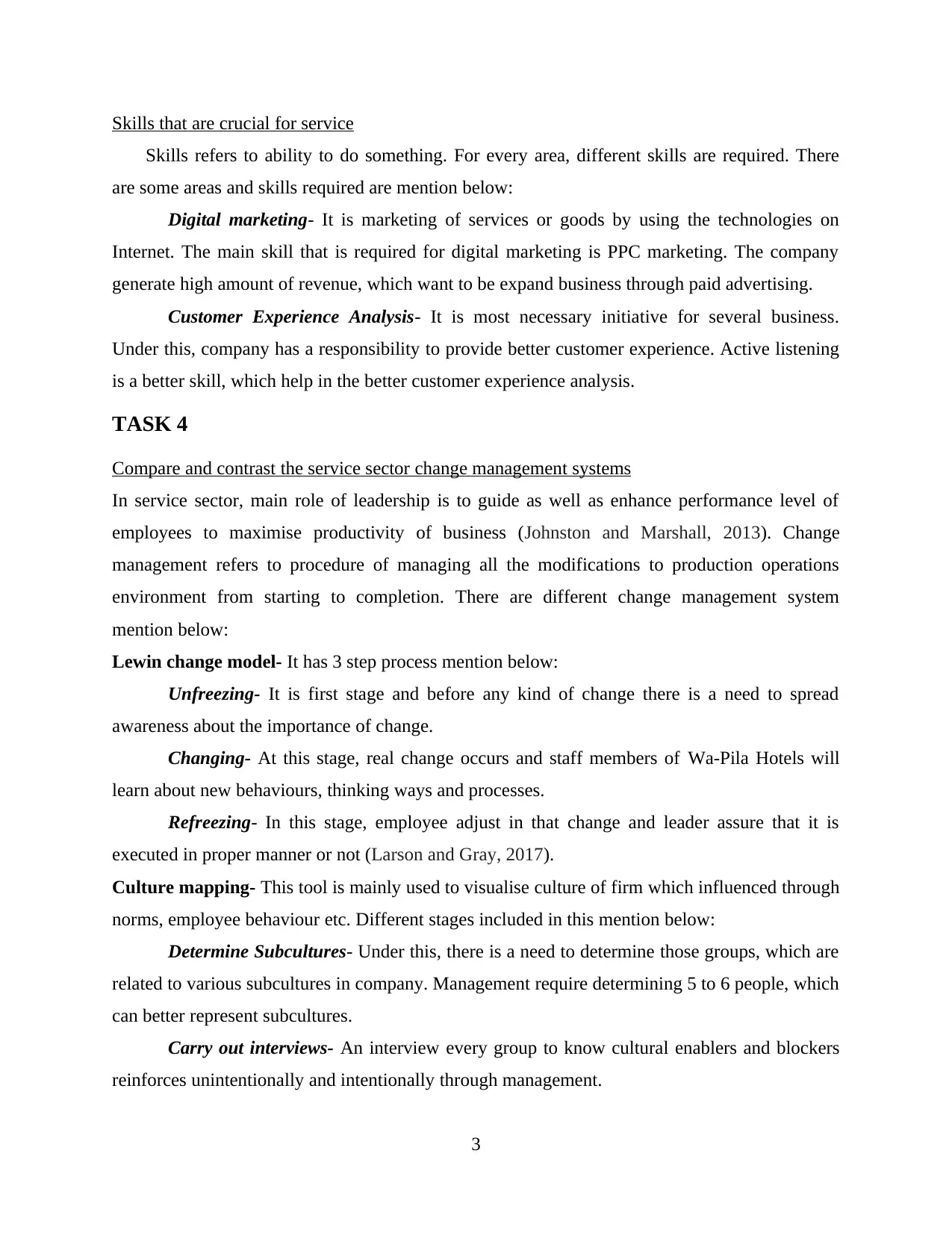
Skills that are crucial for service
Skills refers to ability to do something. For every area, different skills are required. There
are some areas and skills required are mention below:
Digital marketing- It is marketing of services or goods by using the technologies on
Internet. The main skill that is required for digital marketing is PPC marketing. The company
generate high amount of revenue, which want to be expand business through paid advertising.
Customer Experience Analysis- It is most necessary initiative for several business.
Under this, company has a responsibility to provide better customer experience. Active listening
is a better skill, which help in the better customer experience analysis.
TASK 4
Compare and contrast the service sector change management systems
In service sector, main role of leadership is to guide as well as enhance performance level of
employees to maximise productivity of business (Johnston and Marshall, 2013). Change
management refers to procedure of managing all the modifications to production operations
environment from starting to completion. There are different change management system
mention below:
Lewin change model- It has 3 step process mention below:
Unfreezing- It is first stage and before any kind of change there is a need to spread
awareness about the importance of change.
Changing- At this stage, real change occurs and staff members of Wa-Pila Hotels will
learn about new behaviours, thinking ways and processes.
Refreezing- In this stage, employee adjust in that change and leader assure that it is
executed in proper manner or not (Larson and Gray, 2017).
Culture mapping- This tool is mainly used to visualise culture of firm which influenced through
norms, employee behaviour etc. Different stages included in this mention below:
Determine Subcultures- Under this, there is a need to determine those groups, which are
related to various subcultures in company. Management require determining 5 to 6 people, which
can better represent subcultures.
Carry out interviews- An interview every group to know cultural enablers and blockers
reinforces unintentionally and intentionally through management.
3
Skills refers to ability to do something. For every area, different skills are required. There
are some areas and skills required are mention below:
Digital marketing- It is marketing of services or goods by using the technologies on
Internet. The main skill that is required for digital marketing is PPC marketing. The company
generate high amount of revenue, which want to be expand business through paid advertising.
Customer Experience Analysis- It is most necessary initiative for several business.
Under this, company has a responsibility to provide better customer experience. Active listening
is a better skill, which help in the better customer experience analysis.
TASK 4
Compare and contrast the service sector change management systems
In service sector, main role of leadership is to guide as well as enhance performance level of
employees to maximise productivity of business (Johnston and Marshall, 2013). Change
management refers to procedure of managing all the modifications to production operations
environment from starting to completion. There are different change management system
mention below:
Lewin change model- It has 3 step process mention below:
Unfreezing- It is first stage and before any kind of change there is a need to spread
awareness about the importance of change.
Changing- At this stage, real change occurs and staff members of Wa-Pila Hotels will
learn about new behaviours, thinking ways and processes.
Refreezing- In this stage, employee adjust in that change and leader assure that it is
executed in proper manner or not (Larson and Gray, 2017).
Culture mapping- This tool is mainly used to visualise culture of firm which influenced through
norms, employee behaviour etc. Different stages included in this mention below:
Determine Subcultures- Under this, there is a need to determine those groups, which are
related to various subcultures in company. Management require determining 5 to 6 people, which
can better represent subcultures.
Carry out interviews- An interview every group to know cultural enablers and blockers
reinforces unintentionally and intentionally through management.
3
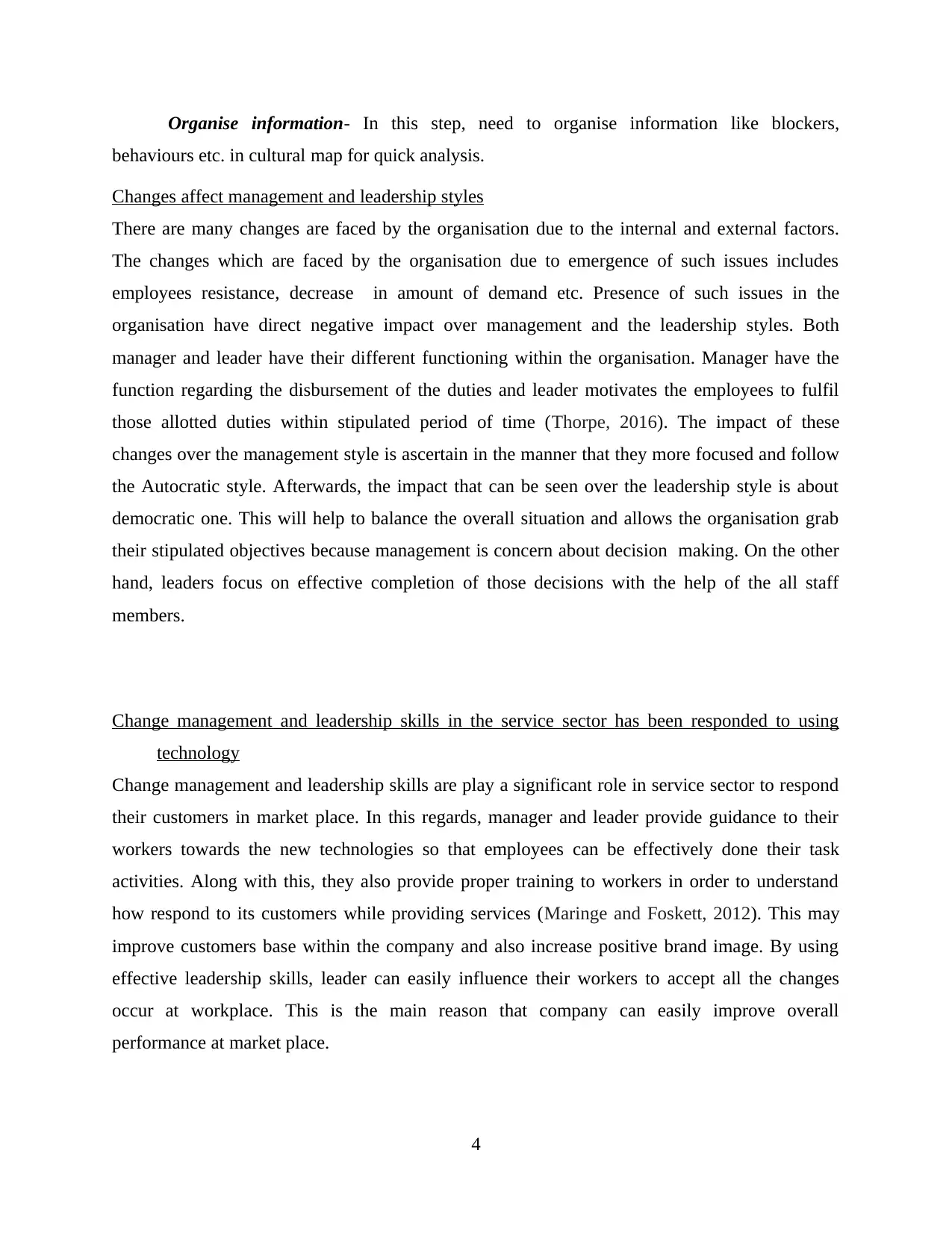
Organise information- In this step, need to organise information like blockers,
behaviours etc. in cultural map for quick analysis.
Changes affect management and leadership styles
There are many changes are faced by the organisation due to the internal and external factors.
The changes which are faced by the organisation due to emergence of such issues includes
employees resistance, decrease in amount of demand etc. Presence of such issues in the
organisation have direct negative impact over management and the leadership styles. Both
manager and leader have their different functioning within the organisation. Manager have the
function regarding the disbursement of the duties and leader motivates the employees to fulfil
those allotted duties within stipulated period of time (Thorpe, 2016). The impact of these
changes over the management style is ascertain in the manner that they more focused and follow
the Autocratic style. Afterwards, the impact that can be seen over the leadership style is about
democratic one. This will help to balance the overall situation and allows the organisation grab
their stipulated objectives because management is concern about decision making. On the other
hand, leaders focus on effective completion of those decisions with the help of the all staff
members.
Change management and leadership skills in the service sector has been responded to using
technology
Change management and leadership skills are play a significant role in service sector to respond
their customers in market place. In this regards, manager and leader provide guidance to their
workers towards the new technologies so that employees can be effectively done their task
activities. Along with this, they also provide proper training to workers in order to understand
how respond to its customers while providing services (Maringe and Foskett, 2012). This may
improve customers base within the company and also increase positive brand image. By using
effective leadership skills, leader can easily influence their workers to accept all the changes
occur at workplace. This is the main reason that company can easily improve overall
performance at market place.
4
behaviours etc. in cultural map for quick analysis.
Changes affect management and leadership styles
There are many changes are faced by the organisation due to the internal and external factors.
The changes which are faced by the organisation due to emergence of such issues includes
employees resistance, decrease in amount of demand etc. Presence of such issues in the
organisation have direct negative impact over management and the leadership styles. Both
manager and leader have their different functioning within the organisation. Manager have the
function regarding the disbursement of the duties and leader motivates the employees to fulfil
those allotted duties within stipulated period of time (Thorpe, 2016). The impact of these
changes over the management style is ascertain in the manner that they more focused and follow
the Autocratic style. Afterwards, the impact that can be seen over the leadership style is about
democratic one. This will help to balance the overall situation and allows the organisation grab
their stipulated objectives because management is concern about decision making. On the other
hand, leaders focus on effective completion of those decisions with the help of the all staff
members.
Change management and leadership skills in the service sector has been responded to using
technology
Change management and leadership skills are play a significant role in service sector to respond
their customers in market place. In this regards, manager and leader provide guidance to their
workers towards the new technologies so that employees can be effectively done their task
activities. Along with this, they also provide proper training to workers in order to understand
how respond to its customers while providing services (Maringe and Foskett, 2012). This may
improve customers base within the company and also increase positive brand image. By using
effective leadership skills, leader can easily influence their workers to accept all the changes
occur at workplace. This is the main reason that company can easily improve overall
performance at market place.
4
⊘ This is a preview!⊘
Do you want full access?
Subscribe today to unlock all pages.

Trusted by 1+ million students worldwide
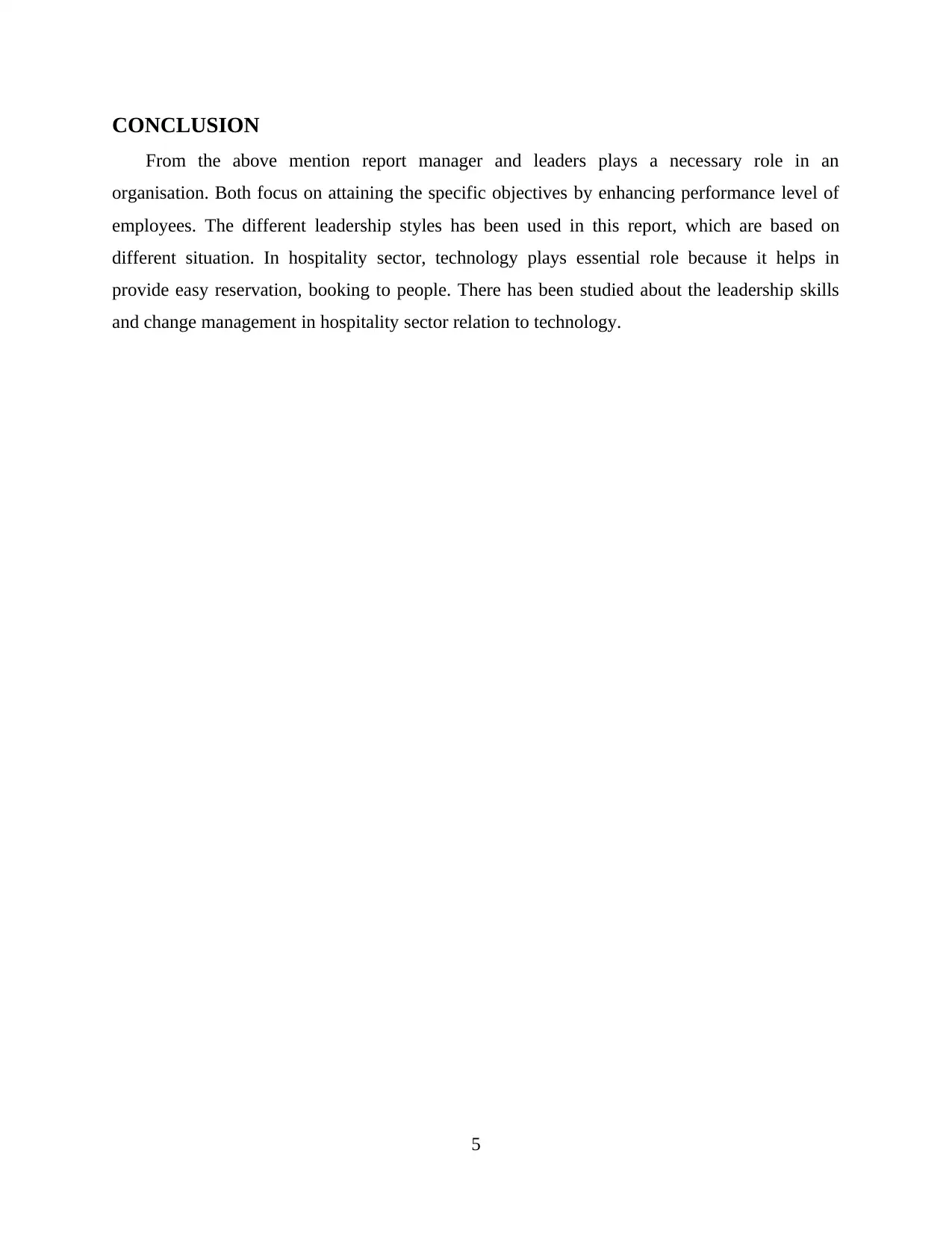
CONCLUSION
From the above mention report manager and leaders plays a necessary role in an
organisation. Both focus on attaining the specific objectives by enhancing performance level of
employees. The different leadership styles has been used in this report, which are based on
different situation. In hospitality sector, technology plays essential role because it helps in
provide easy reservation, booking to people. There has been studied about the leadership skills
and change management in hospitality sector relation to technology.
5
From the above mention report manager and leaders plays a necessary role in an
organisation. Both focus on attaining the specific objectives by enhancing performance level of
employees. The different leadership styles has been used in this report, which are based on
different situation. In hospitality sector, technology plays essential role because it helps in
provide easy reservation, booking to people. There has been studied about the leadership skills
and change management in hospitality sector relation to technology.
5
Paraphrase This Document
Need a fresh take? Get an instant paraphrase of this document with our AI Paraphraser
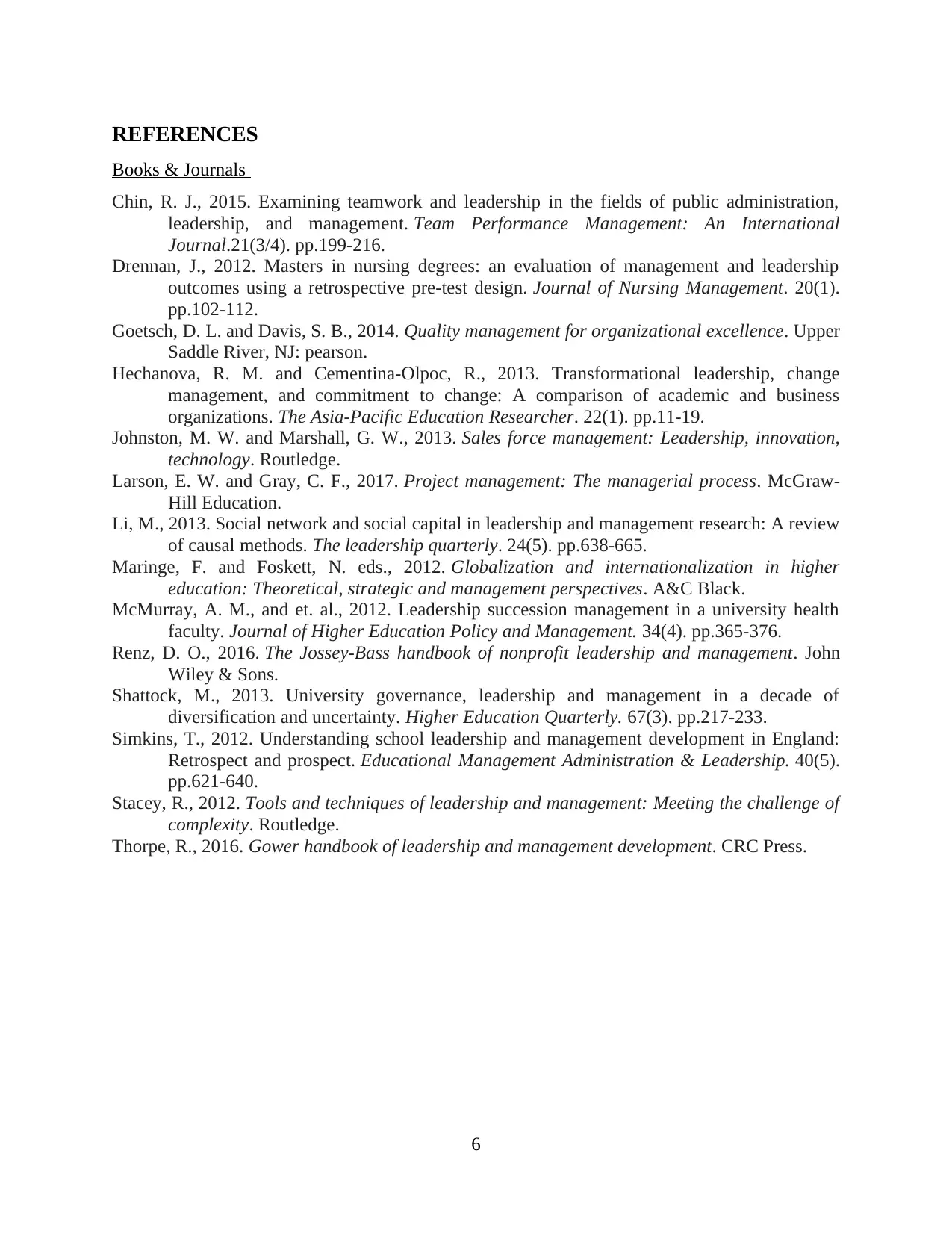
REFERENCES
Books & Journals
Chin, R. J., 2015. Examining teamwork and leadership in the fields of public administration,
leadership, and management. Team Performance Management: An International
Journal.21(3/4). pp.199-216.
Drennan, J., 2012. Masters in nursing degrees: an evaluation of management and leadership
outcomes using a retrospective pre‐test design. Journal of Nursing Management. 20(1).
pp.102-112.
Goetsch, D. L. and Davis, S. B., 2014. Quality management for organizational excellence. Upper
Saddle River, NJ: pearson.
Hechanova, R. M. and Cementina-Olpoc, R., 2013. Transformational leadership, change
management, and commitment to change: A comparison of academic and business
organizations. The Asia-Pacific Education Researcher. 22(1). pp.11-19.
Johnston, M. W. and Marshall, G. W., 2013. Sales force management: Leadership, innovation,
technology. Routledge.
Larson, E. W. and Gray, C. F., 2017. Project management: The managerial process. McGraw-
Hill Education.
Li, M., 2013. Social network and social capital in leadership and management research: A review
of causal methods. The leadership quarterly. 24(5). pp.638-665.
Maringe, F. and Foskett, N. eds., 2012. Globalization and internationalization in higher
education: Theoretical, strategic and management perspectives. A&C Black.
McMurray, A. M., and et. al., 2012. Leadership succession management in a university health
faculty. Journal of Higher Education Policy and Management. 34(4). pp.365-376.
Renz, D. O., 2016. The Jossey-Bass handbook of nonprofit leadership and management. John
Wiley & Sons.
Shattock, M., 2013. University governance, leadership and management in a decade of
diversification and uncertainty. Higher Education Quarterly. 67(3). pp.217-233.
Simkins, T., 2012. Understanding school leadership and management development in England:
Retrospect and prospect. Educational Management Administration & Leadership. 40(5).
pp.621-640.
Stacey, R., 2012. Tools and techniques of leadership and management: Meeting the challenge of
complexity. Routledge.
Thorpe, R., 2016. Gower handbook of leadership and management development. CRC Press.
6
Books & Journals
Chin, R. J., 2015. Examining teamwork and leadership in the fields of public administration,
leadership, and management. Team Performance Management: An International
Journal.21(3/4). pp.199-216.
Drennan, J., 2012. Masters in nursing degrees: an evaluation of management and leadership
outcomes using a retrospective pre‐test design. Journal of Nursing Management. 20(1).
pp.102-112.
Goetsch, D. L. and Davis, S. B., 2014. Quality management for organizational excellence. Upper
Saddle River, NJ: pearson.
Hechanova, R. M. and Cementina-Olpoc, R., 2013. Transformational leadership, change
management, and commitment to change: A comparison of academic and business
organizations. The Asia-Pacific Education Researcher. 22(1). pp.11-19.
Johnston, M. W. and Marshall, G. W., 2013. Sales force management: Leadership, innovation,
technology. Routledge.
Larson, E. W. and Gray, C. F., 2017. Project management: The managerial process. McGraw-
Hill Education.
Li, M., 2013. Social network and social capital in leadership and management research: A review
of causal methods. The leadership quarterly. 24(5). pp.638-665.
Maringe, F. and Foskett, N. eds., 2012. Globalization and internationalization in higher
education: Theoretical, strategic and management perspectives. A&C Black.
McMurray, A. M., and et. al., 2012. Leadership succession management in a university health
faculty. Journal of Higher Education Policy and Management. 34(4). pp.365-376.
Renz, D. O., 2016. The Jossey-Bass handbook of nonprofit leadership and management. John
Wiley & Sons.
Shattock, M., 2013. University governance, leadership and management in a decade of
diversification and uncertainty. Higher Education Quarterly. 67(3). pp.217-233.
Simkins, T., 2012. Understanding school leadership and management development in England:
Retrospect and prospect. Educational Management Administration & Leadership. 40(5).
pp.621-640.
Stacey, R., 2012. Tools and techniques of leadership and management: Meeting the challenge of
complexity. Routledge.
Thorpe, R., 2016. Gower handbook of leadership and management development. CRC Press.
6
1 out of 8
Related Documents
Your All-in-One AI-Powered Toolkit for Academic Success.
+13062052269
info@desklib.com
Available 24*7 on WhatsApp / Email
![[object Object]](/_next/static/media/star-bottom.7253800d.svg)
Unlock your academic potential
Copyright © 2020–2026 A2Z Services. All Rights Reserved. Developed and managed by ZUCOL.





